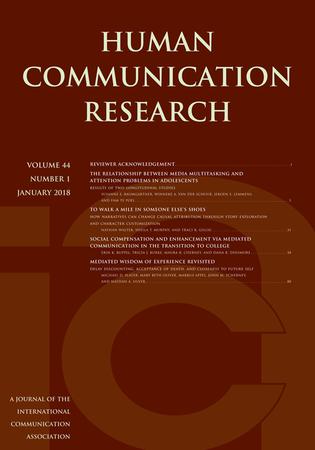接触强势和弱势说服信息后,竞选活动引发的人际沟通
IF 3.3
1区 文学
Q1 COMMUNICATION
引用次数: 0
摘要
媒体宣传活动可以通过信息曝光直接改变受众,也可以通过有关宣传活动的对话间接改变受众。一项实验(232 人)让经常饮用含糖饮料的消费者接触主张减少消费的强势或弱势信息,然后允许交谈或不允许交谈。有证据表明了媒体的直接效应,即私下认为信息有效的重度饮酒者报告了更高的预期消费量减少。然而,如果允许交谈,则会抹杀活动信息对预期减少消费量的预期效果。与效果较弱的宣传信息相比,重度饮酒者对效果较强的宣传信息的评价较低。此外,分析性语言(如 "但是"、"因为")增强了强势信息对酗酒者的说服力,但削弱了弱势信息的说服力。因此,我们观察到,致力于准确评估活动信息的个人内部过程与维护现有含糖饮料消费水平的人际过程之间存在着复杂的相互作用。本文章由计算机程序翻译,如有差异,请以英文原文为准。
Campaign-induced interpersonal communication following exposure to strong and weak persuasive messages
Media campaigns can create change in their audiences directly via message exposure and indirectly via conversations about the campaign. An experiment (N = 232) exposed regular consumers of sugar-sweetened beverages to either strong or weak messages that advocated reduced consumption, then allowed conversation or did not. There was evidence of direct media effects in that heavy drinkers who privately judged the messages as effective reported higher intended consumption reduction. However, when conversation was allowed, it erased the desired effect of campaign messages on intended reduction. Heavy drinkers had less favorable conversations about strong campaign messages than weak ones. Further, analytic language (e.g., but, because) augmented the persuasiveness of strong messages among heavy drinkers, but detracted from the persuasiveness of weak messages. Thus, we observed a complex interplay between intrapersonal processes devoted to the accurate assessment of campaign messages and interpersonal processes that defended existing levels of sugary beverage consumption.
求助全文
通过发布文献求助,成功后即可免费获取论文全文。
去求助
来源期刊

Human Communication Research
COMMUNICATION-
CiteScore
8.20
自引率
2.00%
发文量
28
期刊介绍:
Human Communication Research is one of the official journals of the prestigious International Communication Association and concentrates on presenting the best empirical work in the area of human communication. It is a top-ranked communication studies journal and one of the top ten journals in the field of human communication. Major topic areas for the journal include language and social interaction, nonverbal communication, interpersonal communication, organizational communication and new technologies, mass communication, health communication, intercultural communication, and developmental issues in communication.
 求助内容:
求助内容: 应助结果提醒方式:
应助结果提醒方式:


